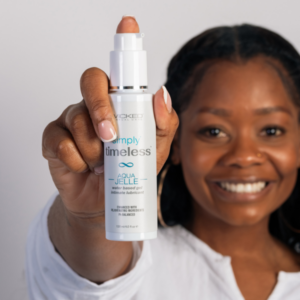How to Talk to Your Doctor About Menopause
 Living with menopause can feel like a wild ride, but talking to your doctor doesn't have to be intimidating. Whether you're just starting to notice the signs of perimenopause or are already in the thick of things, it's crucial to advocate for yourself and your needs. Let's chat about how to confidently discuss menopause and Hormone Replacement Therapy (HRT) with your doctor, manage your physical symptoms, and keep your sex life and intimacy vibrant.
Living with menopause can feel like a wild ride, but talking to your doctor doesn't have to be intimidating. Whether you're just starting to notice the signs of perimenopause or are already in the thick of things, it's crucial to advocate for yourself and your needs. Let's chat about how to confidently discuss menopause and Hormone Replacement Therapy (HRT) with your doctor, manage your physical symptoms, and keep your sex life and intimacy vibrant.
Plus, we’ll introduce you to Wicked Sensual Care's simply® timeless™ collection, specially designed to support your physical and mental health every step of the way.
Understanding Menopause and Perimenopause
Menopause is a natural phase in life that usually hits around age 51, marking the end of menstrual cycles. Perimenopause, the time leading up to menopause, can start in your 40s or even earlier. It's often characterized by irregular periods and a mix of symptoms due to fluctuating hormones.
 Common Symptoms of Menopause:
Common Symptoms of Menopause:
- Hot flashes and night sweats
- Vaginal dryness and discomfort
- Sleep disturbances
- Mood swings and irritability
- Decreased libido
- Memory lapses
- Not feeling like “you”
Recognizing these symptoms and understanding their impact on your daily life is the first step in taking control of your health.
Lesser Known Symptoms of Menopause
Menopause can come with a variety of surprising symptoms. Here are a few lesser-known ones to be aware of:
- Joint pain and stiffness
- Heart palpitations
- Dry skin and eyes
- Tingling sensations
- Gum problems
- Changes in body odor
- Itchy ears
- Ringing in the ears
Being aware of these symptoms can help you better understand and communicate your experiences to your doctor.
Preparing for Your Doctor's Appointment
Talking openly with your healthcare provider is key. Here are some friendly tips to help you get ready:
1. Track Your Symptoms
Keep a journal or use a symptom tracker to note what you're experiencing. Include details like how often you have hot flashes, sleep problems, or vaginal dryness. This info will help your doctor understand what's going on and tailor a treatment plan just for you.
2. Do Your Research
Get familiar with the latest information on menopause and HRT. Websites like Balance-Menopause offer great resources and symptom tracking tools to boost your knowledge.
3. Write Down Your Questions
Make a list of questions and concerns to bring to your appointment. This way, you won't forget to address anything important during your visit.
4. Bring Support
Consider bringing a friend or family member. They can help take notes and provide emotional support, making the experience a little less daunting.
Talking About Hormone Replacement Therapy (HRT)
HRT can be a lifesaver for managing menopause symptoms, but it's important to weigh the benefits and risks with your doctor.
New Research on HRT
Recent studies have shown that HRT isn't the cancer risk it was once thought to be. Many people with a history of cancers in their families are still candidates for HRT. If your primary physician isn't up-to-date on this, consider seeing a specialist who focuses on menopause and hormones. It's crucial to get the most accurate and current information to make informed decisions about your health.
For more details, check out this scientific article on HRT and cancer risk.
Questions to Ask About HRT:
- What types of HRT are available?
- How do they work, and what are the potential benefits and risks?
- Are there non-hormonal alternatives I should consider?
- How will we monitor the effectiveness and side effects of HRT?
Advocating for HRT
If you're considering HRT, be clear about why. Explain how your symptoms are affecting your life and express your interest in trying HRT. It's your right to make informed decisions about your health, and your doctor should support you in finding the best treatment plan.
Symptom Management Beyond Hormone Levels
Remember, managing menopause isn't just about hormone levels. It's also about finding relief from symptoms and improving your quality of life. Talk to your doctor about tailoring treatments to meet your specific needs and goals.
Discussing Menopause's Effects on Sex and Intimacy
Menopause can affect your sex life and intimacy, but open communication with your doctor can lead to effective solutions.
 Addressing Vaginal Dryness and Discomfort
Addressing Vaginal Dryness and Discomfort
Vaginal dryness is a common menopause symptom that can make sex uncomfortable. Ask your doctor about using lubricants and moisturizers, like Wicked Sensual Care's simply® timeless™ collection, designed to enhance comfort and pleasure despite hormonal changes.
Exploring Treatment Options
Discuss treatments like localized estrogen therapy, which can relieve vaginal dryness and improve sexual function without significant systemic effects. Your doctor can help you find the best approach based on your symptoms and medical history.
Maintaining Intimacy
Talk about ways to maintain intimacy with your partner. This might include scheduling intimate time, exploring new ways to connect, and using products that enhance sexual comfort and pleasure.
 simply® timeless™ Collection Benefits
simply® timeless™ Collection Benefits
Wicked Sensual Care's simply® timeless™ collection features products formulated with soothing ingredients like aloe, olive leaf extract, and Vitamin E. These products are designed to provide relief from vaginal dryness and enhance intimate experiences, making them perfect for those going through menopause.
Steps to Advocate for Yourself
Advocating for your health means being informed, prepared, and assertive. Here's a quick rundown:
1. Do Your Research
- Learn about menopause, perimenopause, and HRT.
- Use reliable resources and symptom tracking tools.
2. Prepare for Appointments
- Track your symptoms and bring detailed records to your doctor's visit.
- Write down questions and concerns.
- Bring a support person if desired.
3. Communicate Effectively
- Be clear and concise about your symptoms and treatment preferences.
- Ask about all available options and their potential benefits and risks.
- Insist on a collaborative approach to your healthcare decisions.
4. Follow Up
- If you're not satisfied with the initial consultation, don't hesitate to seek a second opinion or follow up with additional questions.
Overcoming Obstacles
Sometimes, you might face challenges when discussing menopause with your doctor. Here are some tips to navigate these situations:
Facing Resistance
If your doctor is hesitant to prescribe HRT or other treatments, ask for specific reasons. Use your research to discuss evidence-based options and explain how your symptoms impact your daily life. Remember, it's okay to challenge decisions and seek a second opinion if necessary.
Dealing with Misconceptions
Correct any misconceptions your doctor might have about menopause symptoms and treatments. Share up-to-date guidelines and studies to support your case.
Persistence Pays Off
Don't give up if you don't get the desired outcome right away. Be persistent, continue researching, and keep advocating for your health. Finding the right treatment plan can take time, but it's worth the effort.
 Empowering Your Menopausal Journey
Empowering Your Menopausal Journey
Managing menopause involves addressing both physical and emotional aspects. By advocating for yourself, staying informed, and communicating openly with your healthcare provider, you can navigate this phase with confidence and grace. Remember, menopause is a natural part of life, and with the right support and resources, you can maintain a fulfilling and active lifestyle.
Key Takeaways:
- Track Symptoms: Use tools to monitor and document your symptoms.
- Research: Familiarize yourself with treatment options and guidelines.
- Prepare for Appointments: Write down questions and bring a support person if desired.
- Communicate: Be clear about your symptoms and preferences, and insist on shared decision-making.
- Follow Up: Seek second opinions if necessary and be persistent in advocating for your health.
- Use Products Like simply® timeless™: Enhance comfort and pleasure with specialized products designed for perimenopause, menopause, and beyond.
At Wicked Sensual Care, we're here to support your journey through menopause with products that enhance your intimate experiences and overall well-being. Embrace this phase of life with empowerment and self-advocacy.
For more information about perimenopause, menopause, and beyond, check out our Educational Hub.
Sources:
Share with your friends:
Subscribe to the Wicked Sensual Community Newsletter!

